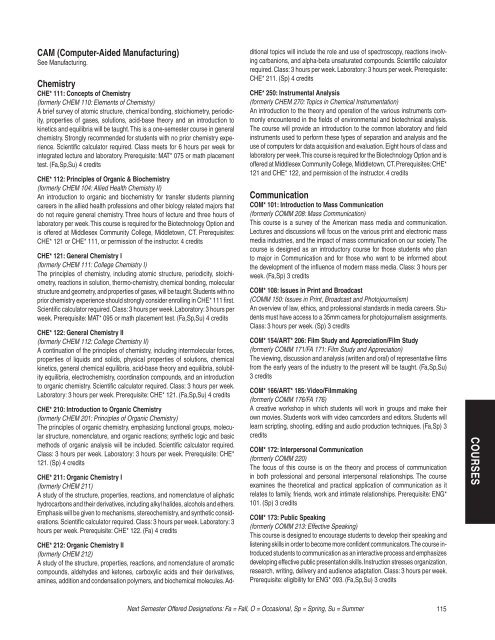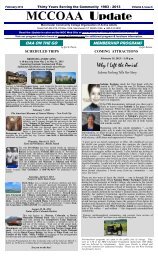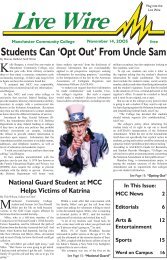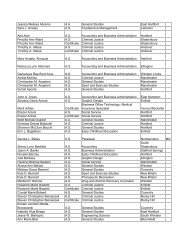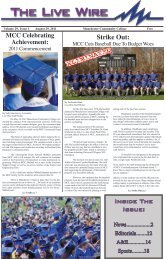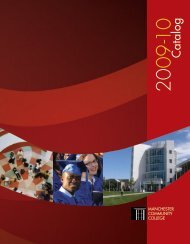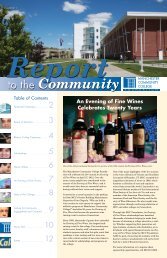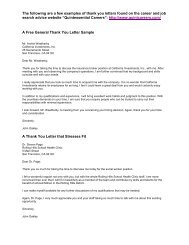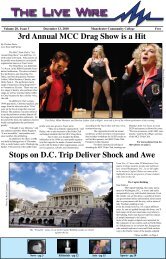Liberal Arts and Science - Manchester Community College ...
Liberal Arts and Science - Manchester Community College ...
Liberal Arts and Science - Manchester Community College ...
You also want an ePaper? Increase the reach of your titles
YUMPU automatically turns print PDFs into web optimized ePapers that Google loves.
CAM (Computer-Aided Manufacturing)<br />
See Manufacturing.<br />
Chemistry<br />
CHE* 111: Concepts of Chemistry<br />
(formerly CHEM 110: Elements of Chemistry)<br />
A brief survey of atomic structure, chemical bonding, stoichiometry, periodicity,<br />
properties of gases, solutions, acid-base theory <strong>and</strong> an introduction to<br />
kinetics <strong>and</strong> equilibria will be taught. This is a one-semester course in general<br />
chemistry. Strongly recommended for students with no prior chemistry experience.<br />
Scientific calculator required. Class meets for 6 hours per week for<br />
integrated lecture <strong>and</strong> laboratory. Prerequisite: MAT* 075 or math placement<br />
test. (Fa,Sp,Su) 4 credits<br />
CHE* 112: Principles of Organic & Biochemistry<br />
(formerly CHEM 104: Allied Health Chemistry II)<br />
An introduction to organic <strong>and</strong> biochemistry for transfer students planning<br />
careers in the allied health professions <strong>and</strong> other biology related majors that<br />
do not require general chemistry. Three hours of lecture <strong>and</strong> three hours of<br />
laboratory per week. This course is required for the Biotechnology Option <strong>and</strong><br />
is offered at Middlesex <strong>Community</strong> <strong>College</strong>, Middletown, CT. Prerequisites:<br />
CHE* 121 or CHE* 111, or permission of the instructor. 4 credits<br />
CHE* 121: General Chemistry I<br />
(formerly CHEM 111: <strong>College</strong> Chemistry I)<br />
The principles of chemistry, including atomic structure, periodicity, stoichiometry,<br />
reactions in solution, thermo-chemistry, chemical bonding, molecular<br />
structure <strong>and</strong> geometry, <strong>and</strong> properties of gases, will be taught. Students with no<br />
prior chemistry experience should strongly consider enrolling in CHE* 111 first.<br />
Scientific calculator required. Class: 3 hours per week. Laboratory: 3 hours per<br />
week. Prerequisite: MAT* 095 or math placement test. (Fa,Sp,Su) 4 credits<br />
CHE* 122: General Chemistry II<br />
(formerly CHEM 112: <strong>College</strong> Chemistry II)<br />
A continuation of the principles of chemistry, including intermolecular forces,<br />
properties of liquids <strong>and</strong> solids, physical properties of solutions, chemical<br />
kinetics, general chemical equilibria, acid-base theory <strong>and</strong> equilibria, solubility<br />
equilibria, electrochemistry, coordination compounds, <strong>and</strong> an introduction<br />
to organic chemistry. Scientific calculator required. Class: 3 hours per week.<br />
Laboratory: 3 hours per week. Prerequisite: CHE* 121. (Fa,Sp,Su) 4 credits<br />
CHE* 210: Introduction to Organic Chemistry<br />
(formerly CHEM 201: Principles of Organic Chemistry)<br />
The principles of organic chemistry, emphasizing functional groups, molecular<br />
structure, nomenclature, <strong>and</strong> organic reactions; synthetic logic <strong>and</strong> basic<br />
methods of organic analysis will be included. Scientific calculator required.<br />
Class: 3 hours per week. Laboratory: 3 hours per week. Prerequisite: CHE*<br />
121. (Sp) 4 credits<br />
CHE* 211: Organic Chemistry I<br />
(formerly CHEM 211)<br />
A study of the structure, properties, reactions, <strong>and</strong> nomenclature of aliphatic<br />
hydrocarbons <strong>and</strong> their derivatives, including alkyl halides, alcohols <strong>and</strong> ethers.<br />
Emphasis will be given to mechanisms, stereochemistry, <strong>and</strong> synthetic considerations.<br />
Scientific calculator required. Class: 3 hours per week. Laboratory: 3<br />
hours per week. Prerequisite: CHE* 122. (Fa) 4 credits<br />
CHE* 212: Organic Chemistry II<br />
(formerly CHEM 212)<br />
A study of the structure, properties, reactions, <strong>and</strong> nomenclature of aromatic<br />
compounds, aldehydes <strong>and</strong> ketones, carboxylic acids <strong>and</strong> their derivatives,<br />
amines, addition <strong>and</strong> condensation polymers, <strong>and</strong> biochemical molecules. Ad-<br />
ditional topics will include the role <strong>and</strong> use of spectroscopy, reactions involving<br />
carbanions, <strong>and</strong> alpha-beta unsaturated compounds. Scientific calculator<br />
required. Class: 3 hours per week. Laboratory: 3 hours per week. Prerequisite:<br />
CHE* 211. (Sp) 4 credits<br />
CHE* 250: Instrumental Analysis<br />
(formerly CHEM 270: Topics in Chemical Instrumentation)<br />
An introduction to the theory <strong>and</strong> operation of the various instruments commonly<br />
encountered in the fields of environmental <strong>and</strong> biotechnical analysis.<br />
The course will provide an introduction to the common laboratory <strong>and</strong> field<br />
instruments used to perform these types of separation <strong>and</strong> analysis <strong>and</strong> the<br />
use of computers for data acquisition <strong>and</strong> evaluation. Eight hours of class <strong>and</strong><br />
laboratory per week. This course is required for the Biotechnology Option <strong>and</strong> is<br />
offered at Middlesex <strong>Community</strong> <strong>College</strong>, Middletown, CT. Prerequisites: CHE*<br />
121 <strong>and</strong> CHE* 122, <strong>and</strong> permission of the instructor. 4 credits<br />
Communication<br />
COM* 101: Introduction to Mass Communication<br />
(formerly COMM 208: Mass Communication)<br />
This course is a survey of the American mass media <strong>and</strong> communication.<br />
Lectures <strong>and</strong> discussions will focus on the various print <strong>and</strong> electronic mass<br />
media industries, <strong>and</strong> the impact of mass communication on our society. The<br />
course is designed as an introductory course for those students who plan<br />
to major in Communication <strong>and</strong> for those who want to be informed about<br />
the development of the influence of modern mass media. Class: 3 hours per<br />
week. (Fa,Sp) 3 credits<br />
COM* 108: Issues in Print <strong>and</strong> Broadcast<br />
(COMM 150: Issues in Print, Broadcast <strong>and</strong> Photojournalism)<br />
An overview of law, ethics, <strong>and</strong> professional st<strong>and</strong>ards in media careers. Students<br />
must have access to a 35mm camera for photojournalism assignments.<br />
Class: 3 hours per week. (Sp) 3 credits<br />
COM* 154/ART* 206: Film Study <strong>and</strong> Appreciation/Film Study<br />
(formerly COMM 171/FA 171: Film Study <strong>and</strong> Appreciation)<br />
The viewing, discussion <strong>and</strong> analysis (written <strong>and</strong> oral) of representative films<br />
from the early years of the industry to the present will be taught. (Fa,Sp,Su)<br />
3 credits<br />
COM* 166/ART* 185: Video/Filmmaking<br />
(formerly COMM 176/FA 176)<br />
A creative workshop in which students will work in groups <strong>and</strong> make their<br />
own movies. Students work with video camcorders <strong>and</strong> editors. Students will<br />
learn scripting, shooting, editing <strong>and</strong> audio production techniques. (Fa,Sp) 3<br />
credits<br />
COM* 172: Interpersonal Communication<br />
(formerly COMM 220)<br />
The focus of this course is on the theory <strong>and</strong> process of communication<br />
in both professional <strong>and</strong> personal interpersonal relationships. The course<br />
examines the theoretical <strong>and</strong> practical application of communication as it<br />
relates to family, friends, work <strong>and</strong> intimate relationships. Prerequisite: ENG*<br />
101. (Sp) 3 credits<br />
COM* 173: Public Speaking<br />
(formerly COMM 213: Effective Speaking)<br />
This course is designed to encourage students to develop their speaking <strong>and</strong><br />
listening skills in order to become more confident communicators. The course introduced<br />
students to communication as an interactive process <strong>and</strong> emphasizes<br />
developing effective public presentation skills. Instruction stresses organization,<br />
research, writing, delivery <strong>and</strong> audience adaptation. Class: 3 hours per week.<br />
Prerequisite: eligibility for ENG* 093. (Fa,Sp,Su) 3 credits<br />
Next Semester Offered Designations: Fa = Fall, O = Occasional, Sp = Spring, Su = Summer 115<br />
COURSES


